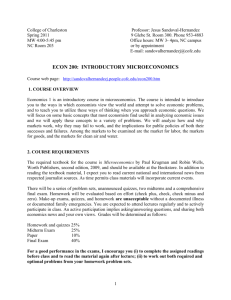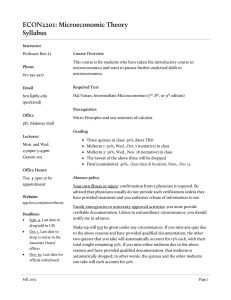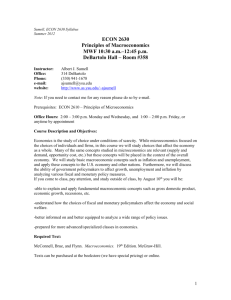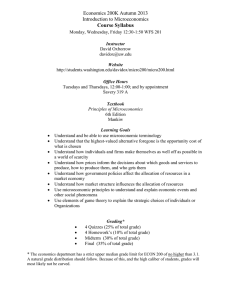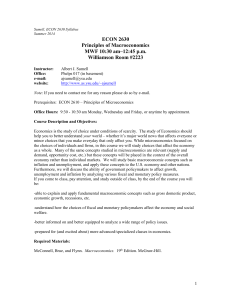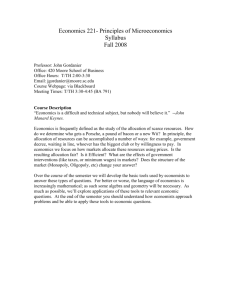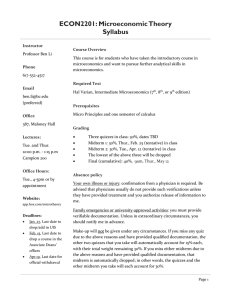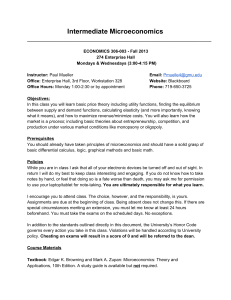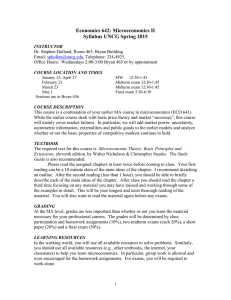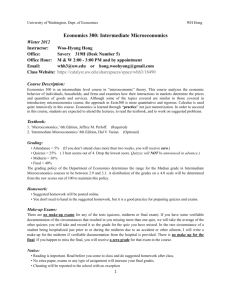Chapter 1. Introduction
advertisement
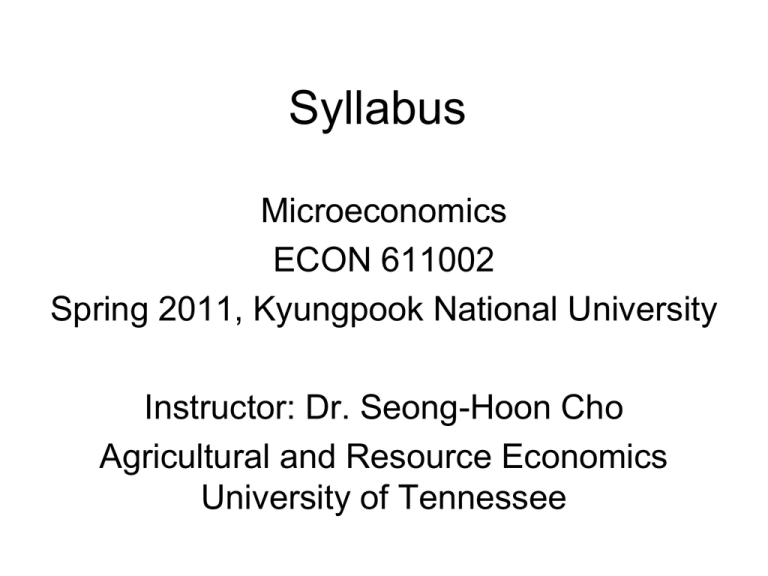
Syllabus Microeconomics ECON 611002 Spring 2011, Kyungpook National University Instructor: Dr. Seong-Hoon Cho Agricultural and Resource Economics University of Tennessee Course Objectives • This class is designed to study how individuals, households and firms make decisions to allocate limited resources, typically in markets where goods or services are being bought and sold. • We will examine how these decisions and behaviors affect the supply and demand for goods and services, which determine prices; and how prices, in turn, determine the supply and demand of goods and services. General Student Responsibility • Your responsibilities are to attend class, • To be on time, • To do the reading before and/or after the material is covered in lecture, • To take quizzes/exams at the designated time, • To actively participate in-class presentation, and • To report any academic dishonesty. • Class room: Kyung Sang Hall (경상대) 311, Tue: 10:30am, Thr: 9:00am • Instructor office: Kyung Sang Hall (경상대) 401 • Required text: Perloff, Jeffrey M., Microeconomics, Fifth Edition • Course requirements: Class presentation 10% Attendance 10% Midterm 40% Final (Comprehensive) 40% Total 100% • 상대평가: 경북대 내규 Date Topic Chapter Lecture No. March 3, 8 Syllabus / Introduction & Economic Models / Demand Chapters 1, 2 1 March 10, 17 Summing Demand Curves, Supply / Market Equilibrium / Supply and Demand Curves Chapter 2 2 Chapter 3 3 March 18 (makeup Elasticities / Effects of Sales Tax for 15), 22 March 24, 29, 31 Preferences / Preferences & Utility / Utility & Budget Constraint / Constrained Consumer Choice Chapter 4 4 April 5, 7 Deriving Demand Curve/ Effects of Price Change / Firms & Production Chapter 5 5 April 12, 14 Law of Diminishing Marginal Returns / Isoquant & Return to scale Chapter 6 6 April 19 (Tue) Midterm April 21, 26 Costs Chapter 7 7 April 28, May 3 Competition & Profit Maximization Chapter 8 8 May 5, 12 Welfare Analysis Chapter 9 9 May 17, 19 Monopoly Chapter 11 10 May 24, 26 Uncertainty / Research Using Microeconomics Chapter 17 11 May 31, June 2 Externalities, Open Access, and Public Chapter 18 12 June 7 Review All chapters 13 June 9 (Th) Final Each class schedule • Session I: 40 min lecture, 10 min break (individual Q&A) • Session II: 40 min lecture/quiz Communication with me • Please see me after class, call me, e-mail me or drop by my office any time for help except before the classes in the morning. • If I am busy, we can schedule an appointment for another time. • No repeat of the same lecture for individual convenience: It is your responsibility to attend each class. Do not expect me to repeat the same lecture by any means, e.g., office visit, email, or phone call. Quizzes • We will have a quiz at the end of the class. You will grade your quiz by yourself. • There will be no makeup quizzes – I really do not want to hear excuses for missing quizzes, as it is difficult to determine their validity. Make-up exams (midterm and final) • Make-up exams are entirely at my discretion and are generally available only for students with direct KNU exam conflicts or written medical excuses. You must make arrangements with me in advance of the scheduled exam, or will receive a score of zero. Honesty and integrity • A student who attempts to cheat during any exam will receive a failing grade. • You are encouraged to ask to clarify questions during the exam hours; however, inappropriate questions about exams will be considered as attempts to cheat and will result in a failing grade. – For example, you will receive a failing grade for asking “Is this answer I have written down correct?” or “Can I get a hint for this question?” Use of email • All the past power point slides and a power point slide a class ahead will be delivered to you through email. • You are encouraged to print the power point slide a class ahead prior to the class and use it as a note and/or preview. Use of e-mail • I will try to communicate with you in the class but I will use e-mail as alternative communication method. • You are encouraged to check your e-mail account frequently. • I only reply to students’ email inquiries when they make reasonable sense to deserve an answer. I do not reply any type of plea email. Examples of no-reply emails “I have received my grade for the 3rd midterm and am less than happy with the result, i know that i missed the first multiple choice question and that is the reason my grade went from a 98 to an 88, and i believe that if you review the 4 pages of work that it took me to do the remaining 9 questions there would be no doubt that i understand the material and studied a lot for this exam. In order to get a B in this class i needed a 92 on this exam. I don't think that one question should have cost me an entire letter grade on this exam and as a result a letter grade in the class.” More examples • 제가 부득이한 사정으로 첫째시간 수업을 참석하지 못했는데요....여러가지 수강생들이 알아야 할 점이나.. 주의사항들에 설명해 주셨을 듯한데 그 부분에 있어서 알려주셨으면 감사하겠습니다.” Low grade warning • Students with a midterm grade lower than 60 are required to schedule a meeting with me. Failure to attempt to schedule a meeting may result in receiving a failing grade. Accommodation of students with disability • I recognize its obligation to provide reasonable academic accommodation to students with disabilities where the accommodation can be implemented without compromising the academic integrity of the course or program. Last but not least… • Please refrain from cellular phone use of any kind in class (e.g., texting, emailing) Chapter 1. Introduction What is microeconomics? – The study of the allocation of scarce resources • Scarcity is the mother of economics – The study of supply and demand (e.g., gasoline, food) How do you study microeconomics? • Memorization X • Understanding O • Logical thinking O Three players of microecomics • Consumer – Maximize individual happiness (utility) • Producer – Maximize profit, minimize cost • Government – Maximize public happiness (utility)
